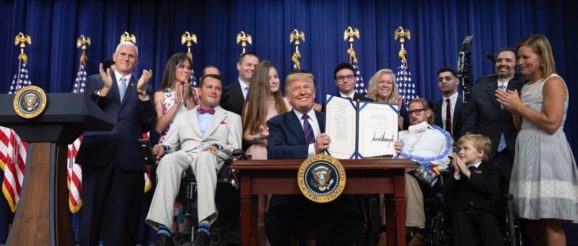Goldwater Institute’s “Right to Try” Opens Door for Innovation in Coronavirus Crisis – In Defense of Liberty

March 19, 2020
As the nation faces the unprecedented coronavirus healthcare crisis, Washington is using the Goldwater Institute’s years-long work to remove regulatory barriers so Americans can get the right medical treatment at the right time to combat this pandemic.
Central to that effort is reforming the U.S. Food and Drug Administration’s (FDA) bureaucratic drug approval process, which stands between patients and potentially lifesaving vaccines and treatments. Today, at a coronavirus task force briefing, the Trump administration highlighted the importance of Right to Try, a law developed by the Goldwater Institute that served as a critical first step in speeding up the FDA’s process. The law protects the right of patients facing terminal or life-threatening illness to obtain and use cutting-edge medicines without asking first for government permission when a doctor has advised the treatment, and it opened the door for the critical innovation in treatment that Americans need in today’s crisis.
“Right to Try has been a tremendous success. People are living now who had no chance of living,” President Donald Trump said, explaining that the policy has provided hope and breakthrough treatment options that would have otherwise taken years to reach patients who would have run out of time before the treatment obtained final FDA approval years later. “But this is beyond Right to Try. If treatments known to be safe in Europe, Japan, or other nations are effective against the virus, we’ll use that information to protect the health and safety of the American people. Nothing will stand in our way as we pursue any avenue to find what best works against this horrible virus.”
This is a tacit admission that the FDA’s bureaucratic drug approval process is too slow when lives hang in the balance. The Right to Try law, developed by the Goldwater Institute, works in tandem with the current FDA approval process to meet the immediate needs of patients facing life-threatening illness.
As the U.S. looks to possible effective options to treat the virus, it is important that medical professionals know and understand the arsenal of options at their disposal. The Free Speech in Medicine Act, which protects the dissemination of truthful, scientific information about off-label uses of FDA-approved drugs, followed on the heels of Goldwater Institute’s successful campaign for Right To Try, which is now federal law and was adopted in 41 states.
About one-in-five prescriptions is “off-label,” meaning the medicine is FDA-approved, but it is prescribed for a different use or dosage. While doctors can already legally prescribe off-label, federal law prohibits pharmaceutical companies from sharing information about off-label uses with doctors. As a result, doctors and patients may be unaware of alternative treatment options lawfully available them; and, even if they are aware, the information may be dated.
In addition to speeding the approval of treatments, the Goldwater Institute supports efforts to recognize the licenses of medical professionals across state lines. Such an approach is a logical next step from Right to Try, since it helps more people receive treatment more quickly.
The Goldwater Institute commends the important work of the scientific community that is racing to develop therapeutic options and vaccines, as well as the first responders, medical community, and the medical support staff putting their lives on the line in this unprecedented crisis.
The Right to Try movement is based on the belief that no patient facing a terminal illness should have to beg the federal government for permission to save their own life. Right to Try is now the law of the land, after federal legislation was signed into in May 2018 with bipartisan support.
